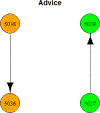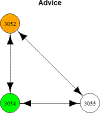Using Systems Theory to Improve Intervention Outcomes
- PMID: 37063246
- PMCID: PMC10100444
- DOI: 10.1037/pro0000467
Using Systems Theory to Improve Intervention Outcomes
Abstract
This article explores the potential of using systems methods for better conceptualizing the unexpected and complex sets of hurdles and opportunities that practicing psychologists frequently encounter. Examples are provided involving two distinct types of important clinical issues: 1) understanding how individuals maintain recovery from substance use disorders following treatment and 2) better understanding patients with chronic, unexplained post-viral illnesses. Traditional research methods used to explore these types of intricate social and medical issues have often lacked sophisticated dynamic systems-based perspectives, which could provide new insights into understanding how patient treatment gains can be maintained and how unexplained post-viral illnesses can be better understood. Our examples will demonstrate that systems-oriented approaches have the potential to provide psychologists unique opportunities to capture a fuller and richer depiction of a variety of clinical and community topics and thus provide new lenses that ultimately could provide better care for our patients.
Figures




Similar articles
-
The future of Cochrane Neonatal.Early Hum Dev. 2020 Nov;150:105191. doi: 10.1016/j.earlhumdev.2020.105191. Epub 2020 Sep 12. Early Hum Dev. 2020. PMID: 33036834
-
Promoting and supporting self-management for adults living in the community with physical chronic illness: A systematic review of the effectiveness and meaningfulness of the patient-practitioner encounter.JBI Libr Syst Rev. 2009;7(13):492-582. doi: 10.11124/01938924-200907130-00001. JBI Libr Syst Rev. 2009. PMID: 27819974
-
Right care, first time: a highly personalised and measurement-based care model to manage youth mental health.Med J Aust. 2019 Nov;211 Suppl 9:S3-S46. doi: 10.5694/mja2.50383. Med J Aust. 2019. PMID: 31679171
-
[Advocacy for the establishment of a comprehensive strategy to reduce the "burden" of schizophrenic disorders].Encephale. 2016 Oct;42(5):476-483. doi: 10.1016/j.encep.2016.05.007. Epub 2016 Sep 9. Encephale. 2016. PMID: 27623121 Review. French.
-
Research on field-based services: models for reform in the delivery of mental health care to populations with complex clinical problems.Am J Psychiatry. 1995 Aug;152(8):1111-23. doi: 10.1176/ajp.152.8.1111. Am J Psychiatry. 1995. PMID: 7625457 Review.
Cited by
-
Social networks illustrate harm reduction mechanisms in recovery homes.J Prev Interv Community. 2025;53(2):209-219. doi: 10.1080/10852352.2025.2491864. Epub 2025 Apr 17. J Prev Interv Community. 2025. PMID: 40243131
-
Understanding Length of Stay in Recovery Homes.J Soc Work Pract Addict. 2024;24(4):406-415. doi: 10.1080/1533256X.2023.2215094. Epub 2023 May 21. J Soc Work Pract Addict. 2024. PMID: 39712239 Free PMC article.
References
-
- von Bertalanffy L (1969). General Systems Theory, George Braziller, New York.
-
- Centers for Disease Control and Prevention (2019). Treatment of ME/CFS Available at: https://www.cdc.gov/me-cfs/treatment/index.html
-
- Coursera (2022) Fundamentals of Immunology: T Cells and Signaling Available at: https://www.coursera.org/lecture/immunologyfundamentalstcellssignaling/i...
Grants and funding
LinkOut - more resources
Full Text Sources
